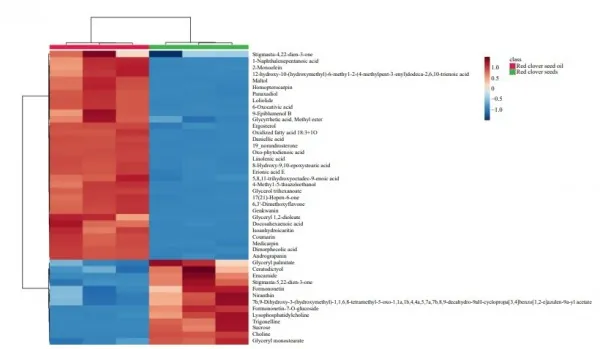
Unlocking the Health Secrets of Red Clover: A Game-Changer in Nutritional Science
2024-10-12
Author: Arjun
Introduction
A groundbreaking study has recently unveiled the tremendous health benefits of red clover (Trifolium pratense), particularly its seeds and oil. Researchers have discovered an abundance of bioactive compounds in these components, indicating that they could play a significant role as functional ingredients in both food and health care products.
Agricultural and Nutritional Importance
Red clover, a member of the Fabaceae family, thrives in temperate regions and is primarily recognized for its ability to enrich soil fertility through nitrogen fixation. Beyond its agricultural advantages, red clover is often seen as a source of nutrition for livestock, but its seeds have rarely been explored for their health-promoting potential. While extracts of the plant’s flowers are widely utilized for alleviating menopausal symptoms and supporting cardiovascular health, the nutritional profile of the seeds has largely gone unnoticed—until now.
Research Findings
Published in the journal Food Innovation and Advances on February 28, 2024, this pivotal study suggests that red clover seed oil could be a revolutionary addition to health-enhancing foods and pharmaceuticals, thanks to its rich composition of unsaturated fatty acids, phenolic compounds, and tocopherols.
Methodology
Using advanced supercritical CO2 extraction methods, the research team meticulously analyzed the chemical makeup of red clover seeds, focusing on various components ranging from proteins to organic acids. They found that proteins constituted about 6.9 g per 100 g of dry matter, while sugars—primarily sucrose and fructose—represented a whopping 91% of total sugars, promoting healthy gut microbiota.
Health Benefits
Notably, the seeds were rich in antioxidants known to combat oxidative stress. Key phenolic compounds identified in the study include taxifolin hexoside and quercetin, both of which have been linked to enhanced cardiovascular health. Furthermore, the seed oil revealed 7.0 g of lipids per 100 g, with 79% being polyunsaturated fatty acids like linoleic acid, well-known for their anti-inflammatory properties and benefits for the heart. The presence of tocopherols, particularly alpha-tocopherol, further strengthens its potential as a powerful antioxidant.
Expert Insights
Lead researcher Dr. Baoru Yang expressed excitement about these findings: "This is the first in-depth exploration of red clover seeds and their oil using state-of-the-art metabolomics techniques. Our results emphasize the exceptional nutritional and bioactive qualities of these seeds, marking red clover seed oil as a possible game changer for the functional foods and pharmaceuticals market."
Conclusion
This pioneering study not only sheds light on the underappreciated benefits of red clover seeds but also opens pathways for further research, potentially positioning them as valuable assets in the realms of nutrition and wellness. As the food and pharmaceutical industries look for natural functional ingredients, red clover seed oil might just be the next big thing, contributing significantly to improving public health. With continued investigation, consumers could soon see red clover seed oil gracing their health products and dietary supplements, marking a significant stride forward in nutritional science.




 Brasil (PT)
Brasil (PT)
 Canada (EN)
Canada (EN)
 Chile (ES)
Chile (ES)
 España (ES)
España (ES)
 France (FR)
France (FR)
 Hong Kong (EN)
Hong Kong (EN)
 Italia (IT)
Italia (IT)
 日本 (JA)
日本 (JA)
 Magyarország (HU)
Magyarország (HU)
 Norge (NO)
Norge (NO)
 Polska (PL)
Polska (PL)
 Schweiz (DE)
Schweiz (DE)
 Singapore (EN)
Singapore (EN)
 Sverige (SV)
Sverige (SV)
 Suomi (FI)
Suomi (FI)
 Türkiye (TR)
Türkiye (TR)